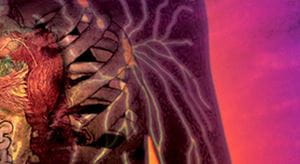
Devices that can perform the function of the heart are a triumph of artificial organ technology, and UPMC is a world leader in their use. Our artificial heart team helps people survive the long wait for a donor heart, helps sustain others who are not candidates for a heart transplant, and has even used these devices to help people recover from heart failure — making transplantation unnecessary. We're working on other solutions to heart failure, too.
In the laboratory of the McGowan Institute, researcher Antonio D’Amore, PhD is engineering synthetic materials for implantation in patients suffering from tissue and organ insufficiencies. Targeted clinical applications for this work are cardiac patches and heart valves.
Read more about modeling tissue engineered constructs.
Microvascular remodeling is an important contributor to vascular disease. Pitt McGowan Institute faculty member Julie Phillippi, PhD's team is broadly interested in how the extracellular matrix (ECM) affects microvascular function, and we are poised to make important contributions in this area to improve mechanistic understanding of human ascending aortic disease. The long-term goal of our work is to develop better strategies to diagnose and treat the over 2.5 million people affected worldwide by dissection and/or rupture of thoracic aortic aneurysm (TAA). At the Cardiac Research Laboratory, the team demonstrated that deficiency in angiogenic factors and collagen immaturity in the adventitial ECM are associated with vasa vasorum remodeling in degenerative and bicuspid aortic valve-associated TAA.
McGowan Institute faculty member David Vorp, PhD, and McGowan Institute colleagues Steven Little, PhD and Justin Weinbaum, PhD, are investigating artificial stem cells in the development of tissue-engineered vascular grafts (TEVGs). The study, entitled “Artificial Stem Cells for Vascular Tissue Engineering,” aims to accelerate the clinical translation of the team’s TEVG technology.
Read more about fabrication of vascular grafts with artificial stem cells.
Also, Dr. Vorp along with McGowan Institute faculty member J. Peter Rubin, MD, FACS are exploring research into the use of cells from a patient’s own adipose (fat) as vascular grafts in arterial bypass surgery. This new method, which has been successful in preclinical trials, would allow surgeons to perform bypass surgeries without harvesting arteries or veins from the patient or requiring the time to isolate and grow a specific cell type, such as a stem cell.
Read more about this research grant.

















